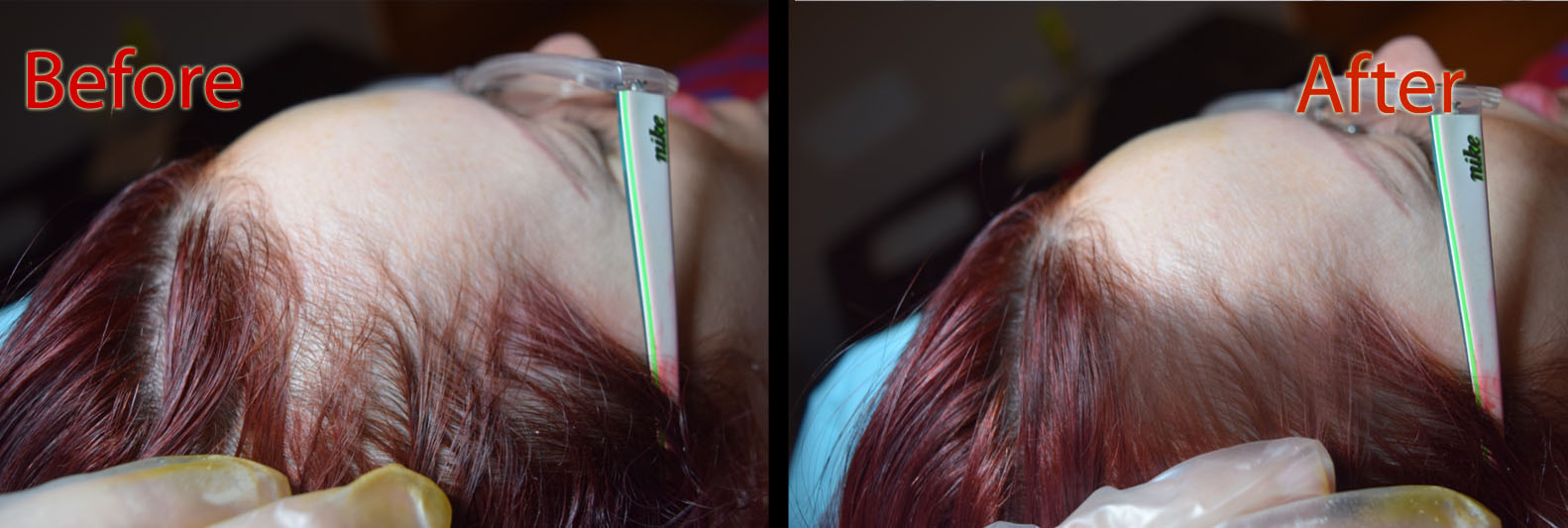Hair loss often serves as one of the most noticeable indicators of thyroid dysfunction. Whether manifesting as general thinning, excessive shedding, or distinct bald patches, thyroid imbalances frequently contribute to compromised hair growth. Both hypothyroidism and hyperthyroidism can significantly impact hair health, leading to distressing and visible changes in hair appearance and density. Let’s explore the connection between thyroid disorder and hair loss below.
How Thyroid Disorder and Hair Loss Are Connected?
The thyroid gland produces hormones that regulate numerous physiological processes throughout the body, including the hair growth cycle. When thyroid hormone levels become imbalanced, hair follicles may enter a weakened or dormant state.
This disruption slows the natural hair production process and results in progressively thinning strands across the scalp. The intricate relationship between thyroid hormones and follicular health means that even minor hormonal fluctuations can produce noticeable changes in hair quality and quantity.
Recognizing Thyroid-Related Hair Loss Symptoms
Thyroid-induced hair loss presents in various forms, ranging from sudden clumps falling out during washing or brushing to gradual thinning that develops over several months. Many individuals first notice changes around the hairline or crown, while others experience diffuse thinning throughout the scalp.
In some cases, eyebrows and eyelashes also become affected. The texture of remaining hair often changes dramatically, becoming dry, brittle, and prone to breakage. These changes affect not only hair volume but also its overall strength, elasticity, and natural shine.
Hypothyroidism Impact on Hair Health
An underactive thyroid fails to produce sufficient hormones necessary for optimal bodily function. This deficiency slows the hair growth cycle, causing more follicles to enter the telogen (resting) phase prematurely.
Consequently, hair production decreases while shedding increases. Common accompanying symptoms include persistent fatigue, unexplained weight gain, heightened sensitivity to cold temperatures, and noticeably slower hair growth accompanied by progressive thinning.
Hyperthyroidism and Its Effects on Hair
Conversely, an overactive thyroid accelerates metabolism beyond healthy levels, putting stress on various body systems. This metabolic overdrive often results in diffuse hair thinning across the scalp rather than localized patches.
Additional symptoms typically include anxiety, unintentional weight loss, rapid or irregular heartbeat, and increased sensitivity to heat. The accelerated metabolic state can exhaust hair follicles, leading to premature shedding and compromised regrowth.
Autoimmune Thyroid Disorder and Hair Health
Autoimmune thyroid disorders, particularly Hashimoto’s thyroiditis (associated with hypothyroidism) and Graves’ disease (linked to hyperthyroidism), present additional challenges for hair health. In these conditions, the immune system mistakenly attacks thyroid tissue, creating chronic inflammation and hormone disruption. This ongoing autoimmune response can directly damage hair follicles, compounding the hair loss already caused by hormonal imbalances.
Treatment Expectations and Recovery Timeline
While appropriate medical management can successfully stabilize thyroid hormone levels, patients should maintain realistic expectations regarding hair regrowth. Even with optimal treatment, visible improvement typically requires several months of consistent therapy.
Many individuals find that their hair never fully returns to its pre-condition thickness or quality, despite achieving normal thyroid function.
This incomplete recovery often leads patients to seek additional solutions for aesthetic concerns.
Nutritional Support for Thyroid and Hair Health
A well-balanced diet plays a crucial role in supporting both thyroid function and hair growth. Essential nutrients include iron, selenium, zinc, and high-quality protein sources. Extreme dieting or severe caloric restriction can exacerbate both thyroid dysfunction and hair loss.
Similarly, chronic stress negatively impacts hormonal balance and follicular health. Maintaining stable nutrition and stress management practices supports overall treatment effectiveness.
Scalp Micropigmentation
For individuals whose hair fails to fully recover despite successful thyroid treatment, scalp micropigmentation (SMP) offers a sophisticated and permanent solution.
This innovative procedure involves precisely depositing specialized pigments into the scalp’s dermal layer, creating the optical illusion of natural hair follicles. SMP effectively addresses various patterns of hair loss while providing immediate, visible results that restore confidence and aesthetic appeal.
Advantages of SMP
Scalp micropigmentation presents several distinct advantages for those struggling with a thyroid disorder and hair loss.
Unlike hair transplant surgery, which involves significant expense, surgical risks, and extended recovery periods, SMP is non-invasive and requires minimal downtime.
Laser therapy treatments often demand months of consistent sessions with uncertain outcomes. In contrast, SMP delivers immediate results through a series of brief sessions, typically completed within 2-4 appointments.
The versatility of SMP makes it suitable for all stages and patterns of hair loss. The procedure seamlessly integrates with existing hair, creating a natural appearance that withstands close inspection. Additionally, SMP avoids the scarring associated with surgical interventions and eliminates the ongoing maintenance required by other treatment modalities.
Choosing the Best SMP Hands
The success of scalp micropigmentation depends entirely on the skill and expertise of the practitioner. Unfortunately, the growing popularity of SMP has led to an influx of inadequately trained providers, particularly tattoo artists who lack specialized SMP training.
These unqualified practitioners often produce substandard results characterized by unnatural dot patterns, incorrect pigment selection, and artificial-looking hairlines that require costly correction procedures.
By choosing qualified, experienced SMP practitioners, patients can achieve natural-looking results that restore confidence and provide lasting satisfaction. The key to success lies in recognizing that SMP is a specialized art form requiring dedicated training and expertise—qualities that distinguish true professionals from inadequately prepared providers.
DermiMatch Clinic has the best scalp practitioners in Arizona who are trained and skilled in scalp micropigmentation.

